Rob Bell's Blog, page 13
April 4, 2019
The Importance of Sleep For Student-Athletes


The Importance of Sleep For Student-Athletes
Overall mental health cannot be achieved without quality sleep. The importance of sleep for student-athletes is vital to mood stabilization, appetite control, and immune system health.
Most athletes understand the importance of recovery and rest days for supporting healthy training and seeing progress.
But, let’s face it, Life, stress, studying, friends, study-groups, and socializing all get top priority over sleep. It’s only after tough events and sheer breakdown of emotions or poor performance that sleep then gets addressed.
You can’t expect strong mental health if you don’t give your body a chance to recover.
Tearing It Down to Build It Back Up
Muscle is built when the body repairs micro tears created during exercise. The mind also repairs itself from stressors and that is how grit and mental toughness is created. However, this process of repairing and re-building isn’t effective at all when you don’t sleep well.
The body cycles through all of the sleep stages several times throughout the night. Sadly, if your sleep cycle is disrupted or shortened, the release of the vital hormone, HGH, gets interrupted and doesn’t take place. Without the correct amount of HGH, muscle recovery slows down. Whether you’re recovering from a workout or an injury, sleep is essential for your body to repair itself at the optimum pace.
Improving Your Sleep Quality
Healthy recovery isn’t just about the amount of slumber.
Although, the hours you sleep before midnight count double.
The importance of sleep for student-athletes is about sleep quality. Frequent waking, difficulty falling asleep, or early waking can all interfere with being rested and recovered.
Good rest also requires healthy sleep hygiene. Sleep hygiene includes all the habits and behaviors in your life that contribute to the quality of your sleep. Sleep hygiene habits you’ll want to consider include:
Devote your bedroom solely to sleep. A home office or gym in your bedroom can make it hard for your brain to shut down at night.
A reasonable bedtime: Go to bed on time, and make sure you’re giving yourself enough time in bed to get a full seven to nine hours of sleep. During intensive training periods, you may need even more, as intensely training athletes can benefit from about 10 hours of sleep each night. A consistent schedule can help your body correctly time the release of sleep hormones and make it easier to get to bed on time each night.
Stress relieving bedtime routine: If you have trouble falling asleep, a bedtime routine can be a good way to relieve stress. Meditation, yoga, or reading a book can help your body relax and trigger the release of sleep hormones. The importance of sleep for student-athletes is that the more consistent you are with your bedtime, the easier it is to wind down and fall asleep.
Turning off screens early: Electronics can give off a bright blue light that suppresses the release of sleep hormones. The light is confusing for your brain and circadian rhythm, sending a signal that it’s daytime (alert time) even when it’s late at night and you should be sleeping. Shut it off when going to bed.
When student-athletes make sleep a priority, you’re giving your body the chance it needs to stay strong and mentally healthy.
March 28, 2019
What is Mental Toughness to You?
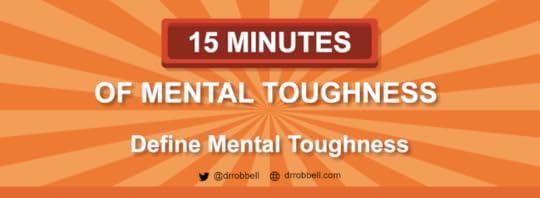
What is Mental Toughness
There are way too many definitions of what is mental toughness and what is mental strength. And I’m talking published research definitions. It seemed to be such a sexy term, that scholars just ran with creating their own meaning.
But, I am a wash and wear kind of guy, I keep it very simple.
But, it does take a genius to keep it simple.
I simply continue to use Jim Loehr’s definition of mental toughness. (Performing well under pressure and how we cope with adversity, 1986).
In my podcast- 15 Minutes of Mental Toughness,
I ask every expert on my show- what is mental toughness to you? I value how these tough people define mental strength and more importantly, how they exhibit it in life. SO FAR, I’ve interviewed two different stroke victims, 10 professional athletes, 5 professional strength coaches, two amazing women that ran 383 miles, ultra-endurance athletes, 6 personal development coaches, and 4 successful entrepreneurs.
Please check out the podcast, subscribe if you will, and leave a review! 15 Minutes of Mental Toughness
Dr. Rob Bell is a Sport Psychology Coach. His company DRB & Associates is based in Indianapolis. Some clients have included: Indy Eleven, University of Notre Dame, Marriott, and Walgreens. Check out all the books.
Please check out the podcast 15 Minutes of Mental Toughness as we interview expert athletes and coaches about Mental Strength and their Hinge Moment.
March 21, 2019
8 Simple Ways To Stay In The Moment


8 Simple Ways To Stay In The Moment
Our brain is powerful and interesting. But, it has one primary job though and that is to keep us safe!
It’s why the very first thought I have in the morning isn’t to go run, or train, my very first thought is actually negative. As Sport Psychologist, Dr. Eddie O’Connor, points out, our brain isn’t really interested in getting better at that moment, it is more interested in staying cozy and warm. SAFE!
So, our brain doesn’t provide us with simple ways to stay in the moment. It often works against us and we need to train our brain and develop habits and routines to keep us focused on the moment.
I can honestly say I’m truly in the moment only during moments of pain and exercise, and when writing. That’s almost it. But, I’m trying to get better at it while driving.
Performances politely ask BEG us to stay in the moment.
It begs because there are so many factors that try and drag our attention away and our brain simply allows it to happen, like an old lap dog.
First, both our skill level and the challenge have to match up.
When these match up, we can become engrossed in a flow state and that’s when we perform our best and it is most enjoyable. However, If the challenge isn’t high enough, we become bored. Or if our skill level or trust in our ability is lacking, then we become anxious. Then there are the outside influences, expectations, people, results, and distractions that also want to take us away from this moment.
Great performers focus on the moment, not the context.
1. Take One Deep Breath-
I doubt you’ll read much about simple ways to stay in the moment if it doesn’t tout the power of breathing.
Try listening to our guided rectangle breathing.
It’s simple and we already do it, but we also take it for granted and don’t pay attention to it. What we want to do with ease, we must first due with due diligence. Setting aside time to do some focused breathing or meditation, will train our brain to be able to take that one deep breath on cue.
2. Close Your Eyes-
Before Collin Altamarino became the first unseeded player to win the USTA national championship, we worked on getting centered and ready for every point. One key that he came up with was a technique before he served. He called it a long blink. He would purposefully close his eyes for a long second before he began his service motion.
It worked!
Jason Day’s pre-shot routine consists of deliberately closing his eyes and visualizing the golf shot. Research has shown that as we close our eyes, the parts of our brain that get activated is our imagination and multi-sensory activity.
It helps us focus. It’s why we close our eyes when trying to remember an important name or detail.
3. Focus on one short term goal-
A focus on winning doesn’t lead to winning, a focus on the process does.
Results, statistics, winning or losing, rankings, are all outcome based focus. There is a lot of fear and unknown in the outcome, because we have no control over it, only influence. If there’s a type of focus that causes angst or doubt or tightness, then it’s looking at the outcome. The way to get back to the moment is to focus on one short-term immediate goal. Make an adjustment and make a play!
4. Find enjoyment in your environment-
Kara Goucher said, “The idea is to beat the distance, not the person next to you.”
One thing that I’ve noticed during my ironman and ultra-distance races is that it is so easy to love on one other and cheer each other on!
Yes, I compete and strive and do my best, but everyone’s goals are similar. And when we are all suffering in those moments, we actually root for each other! When we can take a moment and really enjoy our surroundings and our environment, it’s one of the simple ways to stay in the moment. It becomes an action of gratitude.
5. Compete-
“Fatigue makes cowards of us all.”
[Tweet “”Fatigue makes cowards of us all.“”]
If we don’t practice the skill of competing, then when we really need to be in the moment, that focus won’t be there. Listening to music while running, or giving up when we are tired, and not digging deep through the adversity is how we DO NOT compete. Instead, we are practicing giving in to these distractions. When we compete, we find a way, and finding a way means staying in the moment.
6. Repeat the mantra ” Right Here, Right Now”-
Or use any mantra that will remind you to get back to this moment, this play, or this breath!
7. Get BIG!-
Body language doesn’t talk, it screams! When we are aware and focused on getting BIG, we are actually drawing our attention to being deliberate.
Our intention sets our attention.
Getting BIG builds our confidence as well and it’s the quickest way to build mental strength.
8. Be Thankful-
You can’t be hateful and grateful at the same exact time. When we are not in the moment, thinking about what’s coming up, or what is due, then it’s very easy to slip into worry or stress. When we are in a state of gratitude, it brings us back to the moment! And then we are operating from a place of love rather than hate.
Love doesn’t have to think, hate does.
This isn’t a magical spell either… we have to be in this place of gratitude daily and sometimes hourly. 
Dr. Rob Bell is a Sport Psychology Coach. His company DRB & Associates is based in Indianapolis. Some clients have included: Indy Eleven, University of Notre Dame, Marriott, and Walgreens. Check out all the books.
Please check out the podcast 15 Minutes of Mental Toughness as we interview expert athletes and coaches about Mental Strength and their Hinge Moment.
March 8, 2019
Just ONE WAY to build grit


Just ONE WAY To Build Grit
Before the Super Bowl, 49ers Quarterback Steve Young was finally going to get the “monkey off of his back.” He was prepared.
He memorized all 300 plays with his quarterback coach Mike Shanahan. One way to build grit is through our preparation.
Basically, we need to prepare as if we’ve never won, and play like we’ve never lost.
The night before the game after going through every single play, Coach Shanahan told Steve Young, “Let’s do it just one more time.” After he completed it again, the coach told him “Okay, now you’re ready.”
The good ones practice until they get it right, the great ones practice until they can’t get it wrong.
The one way to build grit and mental toughness is to approach every task with the attitude of just one more.
It is when we are most tired, spent, and mentally or physically exhausted that we need to push ourselves. This is the time that we can dig deep, or that we can just do what everyone else is doing. It is only during these instances that we can get exponentially better.
Check out our INFOGRAPHIC – 11 Tested Ways to Get Out of Your Comfort Zone.
The key in life and sustained progress is doing just 1 more.
In everything that you do today and moving forward, JUST DO ONE MORE. It doesn’t matter what your just one more is either, we are all athletes, our offices are just different.
What takes place when you implement this is that you start to build a pattern. You build a habit. You start to change your identity and you’ve built a skill! The best part is that it becomes a compound rate of return! The more you exercise this muscle, the stronger it’ll be for when you need it most.
Read just one more page from your book.
Write one more paragraph.
Make 1 more sales call.
Take 1 more shot.
Run one more lap.
Finish just one more rep.
Here’s how to implement your just one way to build grit.
Choose an area for today that you’ll really push yourself and when you’re exhausted and ready to stop, you’ll do just one more.
Execute it. Get it done!
Dr. Rob Bell is a Sport Psychology Coach. His company DRB & Associates is based in Indianapolis. Some clients have included: Indy Eleven, University of Notre Dame, Marriott, and Walgreens. Check out all the books.
Please check out the podcast 15 Minutes of Mental Toughness as we interview expert athletes and coaches about Mental Strength and their Hinge Moment.
March 3, 2019
How To Overcome The Big Loss In Sports

How To Overcome The Big Loss in Sports?
Throughout the course of a season, losses will most likely occur, but this is about The BIG LOSS IN SPORTS.
The loss that ends a season, or a missed opportunity so bad, that it causes the worse type of feeling in sports.
If you are in the game long enough, you’ll experience it.
Really good teams and athletes possess a different mindset. They are so confident, that there is little doubt that they will win!
This type of belief is actually what makes them so successful. So, here are five facts of the big loss and five things to do if you experience it.
Five Facts of The Big Loss
It is a shock that the loss happened, and yes, there is sadness and anger, but the overriding emotion becomes a lack of any feeling. The immediate feeling is complete numbness.
The BIG LOSS in sports is more mentally and emotionally painful than any physical pain encountered throughout conditioning or an injury. It hits the core self.
“Success has a thousand fathers, failure is an orphan.” When you win, “everybody” will want to be a part of it, from pats on the back to phone-calls and text messages. However, when you lose, it’s just you. You’ll then realize who is really there for you.
The loss may stay with you. There is so much emotion involved, that it actually becomes time-stamped in our memory.
What follows in the days and weeks ahead is part of the grieving process: Denial, anger, depression, and acceptance. It is a healthy process and there is no speed course.
5 Steps to overcome the big loss in sports:
Read & Re-read: The Man in the Arena & The Man Who Fights the Bull(below).
“Bullfight critics ranked in rows
Crowd the enormous Plaza full
But only one is there who knows
And he’s the man who fights the bull.”
It’s you that put in the hard work, the sacrifice, and the one who played. Refuse to give anyone else the power of how you’ll feel. This is how we overcome The Big Loss in sports. Some of those emotions like “letting people down” or “embarrassment” serve no positive feedback. You’ll have to remove that type of mind-garbage as quickly as it arrives.
There is nothing that can be spoken that will ease the pain. The Big Loss although very painful, will not kill you. It is an inconvenience, not a tragedy. What happens is that our inability to move on is what causes the mental strife.
The ball bounces funny sometimes, and usually with great teams and players, it comes down to a hinge moment: One shot, play, or catch that makes all of the difference.
You have to know that “it is okay.” You lost, and you don’t have to like it, but there is nothing that you can do about it now, except, move-on.
A larger piece of experiencing The Big Loss is your faith and acceptance as a person outside of your sport. It is difficult to accept, but if all you consider yourself is “an athlete”, then how to overcome the Big Loss in Sports is not even the real issue. You have to believe that “you are not only how you play, but you are also so much more.”
Okay, one more….“People have no idea how many times you have to finish 2nd in order to finish 1st.” – Jack Nicklaus
February 21, 2019
We All Need This Type Of Person In Our Life

We All Need This Type Of Person In Our Life
Being negative is like having a cold. It eventually wears off on others.
If there is a room full of twenty people and three have a cold, but 17 are healthy, The chances are greater that most people will also get sick, rather than all healthy.
However, we need to surround ourselves with positive people who view things and events with gratitude and perspective. It’s too easy to be negative.
With that said, this type of person in our life that we need to be successful has to possess that negativity.
I was once in a meeting with a few support staff of a professional soccer team. This meeting included a medical doctor and head athletic trainer of the hospital that provided services to the team. I was brought in by the head coach and had already begun working with the team providing mental skills training. I merely thought this meeting would be decisive in terms of a contract and reporting procedures and such.
I was excited!
But, this meeting did NOT go well.
The Inquisition ended with the medical doctor telling me that I was not a real sports psychology coach, the team didn’t need mental training and that a clinical psychologist would be better suited for the team.
I pulled out my Ph.D. card, my working with professional athletes card, even my sports psychology certification from the national body. Nothing obviously worked in my favor.
I felt pretty small and not good enough. It cut me.
This type of person in our life that we need is not a positive one. It’s not someone who is revered for their coaching abilities or their caring nature. In fact, they aren’t even aware of the power that they possess. The kind of person in our life that we all need is the one who says “you can’t do it” or “you’ll never be good enough!”
Almost every person of success has had that person who told them they wouldn’t make it.
Now, probably the same amount people who were not successful were told the same thing that they weren’t good enough. So, what was the deciding factor?
Being told that we are “not good enough”, “that’s a dumb idea”, or “don’t try it” becomes a fish or cut bait time in our lives. A hinge moment!
What takes place when you hear you’re not good enough?
Chances are it is one of two things. We either accept it and agree with them, OR we use that person as a source of motivation and self-confidence. It solidifies the belief that we must have in ourselves in order to truly achieve greatness.
They turn into a person of “I’ll show you!”
Every successful person was able to use those words of negativity to their advantage. They were driven by that negative person to be confident and were able to pull every ounce of their ability out of themselves.
I’ll show you became their rallying cry!
Kalin Bennett became the first autistic basketball player to sign a DI scholarship. He has a remarkable story of perseverance because he was non-verbal until he was 8 years old. Bennett spoke to the initial therapist who gave him the diagnosis that he might never talk or walk. He told her “I hope you haven’t told anybody else that because you could ruin their lives.”
She gave him the lightning and she became the rod. He should actually thank her because she helped make him!
One publisher sent a rejection letter to J.K. Rowling, author of the Harry Potter series, telling her that she should take a writing class.
Steve Smith was a 5’9 wide receiver who played 16 seasons in the NFL.
Richard Branson was dyslexic and his teachers thought he was dumb and lazy.
Albert Einstein didn’t speak until the age of four and his teachers said, “he wouldn’t amount to much.”
Walt Disney was fired from his job at a newspaper and told: “he was lacking original ideas.”
When Elvis Presley was 18 years old and made two demo tapes that went nowhere, he was told: ” he can’t sing.”
Angela Duckworth, the expert in grit and mental toughness stated she has always had the “I’ll show you” mentality.
When I’m coaching on the PGA tour and I tell one of my players that he won’t execute a certain shot, almost without fail, he’ll channel the vitriol and it’ll be “I’ll show you.”
Is it healthy?
Arian Foster had a good NFL career with the Houston Texans, playing over 8 seasons and rushing for 54 TD’s and over 6,500 yards. However, it’s even better considering he went undrafted coming out of the University of Tennessee.
When he was asked by a teacher in grade school what he wanted to be and he answered a star in the NFL, his teacher laughed at him and asked him “what else?” That moment and person motivated him throughout his entire career.
The danger of the “I’ll prove you wrong” mentality is like a fire.
A campfire or roaring fireplace is great and heats really well. But, these are also controlled.
A wildfire, on the other hand, can cause sheer destruction.
The mentality of proving people wrong can have anger at its core, and revenge or resentments are like poison. We can walk around all day in me vs. the world mindset where everyone is a possible target toward proving them wrong. That’s not healthy.
The result of having this type of person in our life is belief and confidence in ourselves. When someone tries to tell you to have a plan B, just make a better plan A. When you’re told you’re not good enough, you better know that you have the confidence and persistence to make it happen.
Confidence in ourselves is the true “I’ll show you.” And True success means being able to root for everyone.
Dr. Rob Bell is a Sport Psychology Coach. His company DRB & Associates is based in Indianapolis. Some clients have included: Indy Eleven, University of Notre Dame, Marriott, and Walgreens. Check out all the books.
Please check out the podcast 15 Minutes of Mental Toughness as we interview expert athletes and coaches about Mental Strength and their Hinge Moment.
February 18, 2019
What happens after you reach your goal?


What Happens AFTER You Reach Your Goal
My goal was to run a sub 20:00 in a 5k race. So, I trained— Hard!
I ran a 20:05 and then followed it up with a 20:10; it was elusive. I then ran a hilly course at the University of Tennessee and ran a 19:37.
Smashed it. Bam! Goal complete.
I was a Ph.D. student at the time and a graduate teaching assistant. I was so pleased, that I told one of the SEC cross-country runners about my achievement. I’ll never forget his reply, he said: “well, we all have to start somewhere.” Heck, he probably ran a sub 20:00 5k when he was 12.
I wasn’t devasted by the comment, because he just wasn’t that cool, but it did strike a nerve.
My end goal was just a starting point. I thought, “yeah, now what?”
What’s happens when YOU reach YOUR goal?
A few years later I had a goal to swim a sub 1:00 100 yard freestyle. After about a year of swimming and training and a few masters swim meets, I finally swam a 58.7!
One of my fellow swimmers then told me, “once you break a minute, you’ll always break it.” I got scared because I didn’t believe it. I knew how hard I worked to hit that goal of sub 1:00 and the pain of doing it again didn’t appeal to me.
What was next? Swim sub: 57 seconds? I didn’t really want that.
In both of these instances, after the goal was reached, I didn’t have a target or goal, I slowly dropped off. It was a slow fade and it didn’t happen overnight. Rome was not built in a day, but it wasn’t destroyed in a day either.
Rome was not built in a day, but it wasn’t destroyed in a day either.
Click To Tweet
What’s happens when you reach your goal?
I’m not unique.
When the best players have reached #1 ranking in the world in golf or tennis, there is a bit of a drop off for most. Not all, but most have that feeling of “I reached it” only to be let down because it is replaced with a “now what?” Their goal now becomes a target and with it comes expectations, pressure.
Chuck Noll won 4 SuperBowls with the Pittsburgh Steelers and he would talk about how he would go through a month of DEPRESSION after WINNING the Lombardi trophy.
Gold medalists have flown back after winning a Gold Medal and at some point, their thoughts come to “now what?”
How long does the feeling of winning actually last for you?
The interesting thing about high-achievers is that the quest to reach the goal has to be so myopic, that afterward, there is a let-down. Now winning beats losing, but there is still a let-down because no matter what, it’s over. I spoke about this let-down at the NFL combine.
What should you do BEFORE you reach your goal?
What is more important than what to do after a goal is hit is what takes place before.
My downfall was that I’m a shiny object guy. I like and (am good at ) a lot of different sports, but I wasn’t IN LOVE with running or swimming. I liked working toward the goal, but after reaching it, I wanted to focus on different activities and things.
Simply put, before you embark, you have to LOVE the grind and you have to LOVE your chosen passion.
If the passion is not there, then after a goal is reached, there will be a drop-off. And that’s okay. Being able to reinvent yourself is cool, but it does mean that a sacrifice must be made, we can’t have it all at once.
What should you do AFTER you reach your goal?
Celebrate-
The celebration feels much better after hitting your goal, so be able to reflect, enjoy it, and celebrate the process. Celebrate with loved one or teammates! Don’t waste this opportunity. This happens by design, not by default, you must schedule it. But, if you can’t celebrate it, then…
Take a Break-
Having scheduled breaks are a good thing. It’s better than having un-scheduled breaks due to burn-out or pain. Being able to take a scheduled break allows us to recharge and refocus. It’s far better to take a little longer break than it is to take too shot a break.
Consistent > Crazy-
It is much easier to stay in shape than it is to get back in shape. This is true in fitness as well as life. If you allow complacency to set in, then all of the progress eventually drops off. However, we DO NOT need to remain crazy about our preparation, but we do need to remain consistent! We need to focus on keeping our habits strong.
What were our behaviors that led to success and how can we maintain these small cornerstone habits?
One of my favorite podcast guests was Jerrod Moon. Our discussion was all about how our life would change if we could do just one thing every single day for a month? What if we could do one thing every day for an entire year? What would our life be if we could do it for 10 years? It is all about being consistent!
Process > Product-
When you reach success and achievements, it is natural for the goal-posts to move.
We set a new goal. A bigger goal. And that’s cool!
What matters more than reaching our goal however is the process about who we become while striving for our goal. If we can’t recognize our own face or who we are after reaching your goal, then did we make the goal all about us?
If we don’t focus on others and helping them reach their own goals along the journey, then we will remain self-seeking, and only personal success can pacify that ( for a while). But, it is not long-lasting and something else will take its place. But, if we can help others get to where they want to go, then not only will we get what we want, but we will also get greater satisfaction in their success as well.
As I have to remind myself, NO ONE Gets There ALONE.
Dr. Rob Bell is a Sport Psychology Coach. His company DRB & Associates is based in Indianapolis. Some clients have included: Indy Eleven, University of Notre Dame, Marriott, and Walgreens. Check out all the books.
Please check out the podcast 15 Minutes of Mental Toughness as we interview expert athletes and coaches about Mental Strength and their Hinge Moment.
February 1, 2019
When I Get Depressed
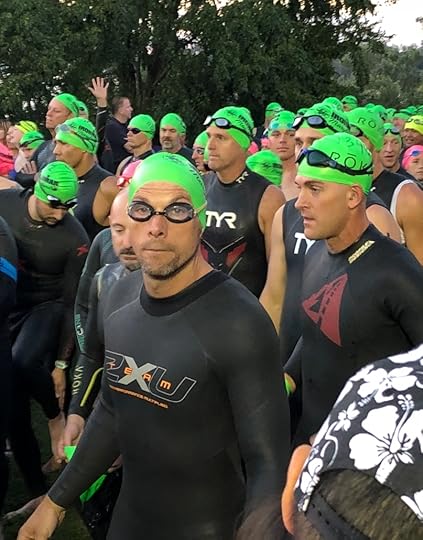
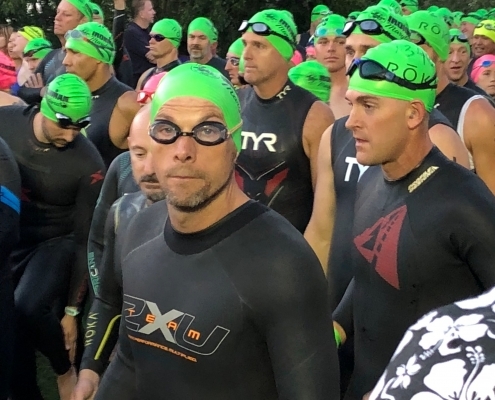
When I get DEPRESSED is NOT in this picture.
I’m probably more alive than any other time in life. This picture is just moments before diving in the Chesapeake Bay for the beginning of the Ironman.
There is something special about the beginning of races and events that bring forth every emotion, almost simultaneously. Excitement, self-assuredness, focused, quiet, hopeful and grateful. And yes, it also opens up feelings and thoughts of anxiousness, self-doubt, vulnerable, and concerned.
All of the emotions we can feel and think come rushing in. That’s the best part of being “IN” life. If we remain on the sidelines, afraid to take risks and get in the game, then we’ll never experience LIFE. That’s the point of being IN the arena and not in the stands as a spectator. We can’t have all of the good feelings and thoughts without the bad, it doesn’t work that way.
You simply can’t grow a garden and not have any weeds.
Click To Tweet
You simply can’t grow a garden and not have any weeds.
When I get depressed is not in this photo. In fact, It’s the opposite. But after all of the training, the excitement, the rewards, and the afterglow of the successful events and accomplishments, I’ll go through withdrawal.
I want to live and stay on the mountaintop of feeling good ALL THE TIME. The only issue is that it’s not reality. Not much grows up on the mountaintop, we have to climb back down to the valley, where the green grass grows. That’s unfortunately when I get depressed.
And so…
My withdrawal does not result in paralysis, but more of an insatiable search for the “next one” and “now what.”
My ego and identity are so wrapped up in what I do, that it takes a major disconnect and reboot for my emotions to catch up. That’s the plague of determination and perseverance, you can’t completely shut it off. So, being left stuck inside of your own head and on a never-ending quest, it creates an endless loop of feelings. That’s why the process is more important than the product. It is just my hope that every experience and event can provide deeper insight into how to deal, cope, and handle the successes and mountaintop experiences.
Dr. Rob Bell is a Sport Psychology Coach. His company DRB & Associates is based in Indianapolis. Some clients have included: Indy Eleven, University of Notre Dame, Marriott, and Walgreens. Check out all the books.
Please check out the podcast 15 Minutes of Mental Toughness as we interview expert athletes and coaches about Mental Strength and their Hinge Moment.
January 31, 2019
How I Changed My Life From Being A Loser
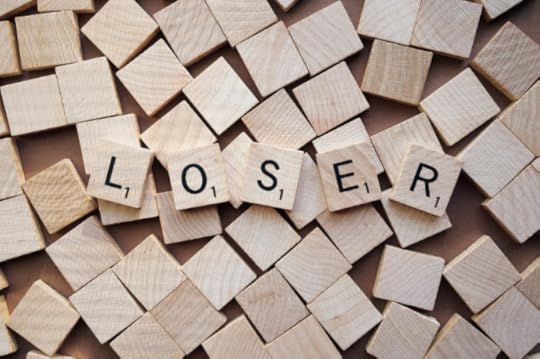
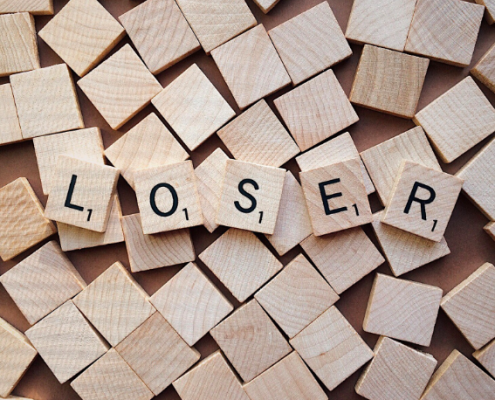
How I Changed My Life From Being A Loser
Now, I wasn’t always a loser. It was a slow fade across many years.
My childhood was full of athletics, family, academics, friends, and more athletics. But along the way, something changed.
Maybe it was pain from parents divorcing and my family splitting up, or anger from no longer being the best at sports because I failed to work hard. Or maybe it was resentment from a changing of coaches who cared to those who didn’t.
Not sure…
What I do know is that I was intent on being with the in-crowd. I slowly became a loser when I started high-school and started partying, and that meant drinking!
Road parties, house parties, or just riding around, it all involved drinking. And in a town known for its liquor stores, drinking meant hard drinking. I wanted to have a good time and hang with those who did the same. That was it.
One doesn’t become a loser overnight. Rome wasn’t built in a day, but it wasn’t destroyed in a day either…
Click To Tweet
One doesn’t become a loser overnight. Rome wasn’t built in a day, but it wasn’t destroyed in a day either…
Once I reached the end of my junior season of high-school, Pot was introduced to my life. I never wanted it before, but soon, I couldn’t get enough of it. It actually became my drug of choice.
The night before my senior year of soccer, I was arrested.
I was partying with friends just two days before the first game and was arrested for possession of marijuana. I was promptly kicked off of the team. It was devastating.
That was a participation trophy toward becoming a loser.
In my small town where everyone waves to everyone, I was no longer waved to. I was now pointed at. I made a mistake, but I wasn’t bad. That hurt, more pain…
I was scared straight and worked really hard for my upcoming baseball season. Weights, training, hitting, being a leader, I was ready.
Then another bombshell.
A few hours before the home opener, during the last period of the day, with my freakin’ baseball uniform already on, I was called to the principal’s office. A sheriff awaited in the office and the principal proceeded to ask me about incidents in the weight room and a broken piece of plexiglass. Unbeknownst to me, a $600 scale and another high priced piece of equipment had been recently damaged in the weight room.
I explained what happened, earlier that week, I was on a dip machine during weight class and it accidentally rocked back and smacked and broke a piece of plexiglass. But, since I was cool, I then rocked it back on purpose and broke it some more. That was it.
I was ordered to pay $12. But I was immediately suspended for 5 school days.
I cried.
The dismissal bell rang for the school and I’ll never forget that feeling of being in my uniform, starting shortstop, the first game of my senior year, and getting escorted to my car and driving home. I wasn’t allowed to even tell the coach what happened or talk to the team. I vaguely remember sitting alone in my kitchen as my dad came home and remember how disappointed he was.
I missed four games! That hurt, more pain.
As I returned to the team, I was so angry, that I took it onto the field with me. I tried to get those missed games back and it was life or death on every game and every at-bat. I put so much pressure on myself that I crumbled throughout the year. “Underachieved” would put it kindly.
More pain…
Drinking is the cause and solution to all of life’s problems.
Click To Tweet
Drinking is the cause and solution to all of life’s problems. I returned to that coping mechanism after the season ended and self-medicated.
Now, I felt at that time, I had received my diploma in being a loser.
I went to college an A+ student in partying. The solution to all of life’s problems.
It was a month into college and I was trying to walk-on in baseball, when at about 2 am one evening I walked off an 80-foot cliff. Most people fall off a cliff, I walked off. Not on purpose, but because we were partying near a cliff!
Drinking was now the cause of the problems. Medics had to crane me up out of the crevasse, where I had split open my head, fractured my back, and broken my arm. But, I was alive!
This accident happened on a Friday and I was back to school on Monday. See, my mom is the oldest of eight, Catholic family, she had zero sympathy. She sent me right back to school, where I was now in immense physical and emotional pain. Try walking around college being pointed at because you were now “that guy who fell off of the cliff!” Baseball was simply no longer.
I considered this winning national championship in losing.
And when you lose, my belief used to be “you’re a loser.” So, I again acquiesced to the solution to life’s problems. I drank…
On April 20th, my second semester in college, I was driving back to school after drinking all day during an earth day festival. (It’s interesting how well we remember small details from events that become so significant in our lives.) I can recall the whole day and especially the drive, because…
I distinctly recollect my car crossing the center line and striking an oncoming van. I was airlifted to Maryland hospital; I had struck the windshield and fractured my face and broken my collarbone.
Months later, I went to have the wires pulled from my mouth because of my broken jaw. The doctor untwisted and pulled out the wires with no local injection mind you, but my gums had grown over the wires and blood gushed over every extraction, and it was excruciating!
I mention this because that still didn’t hurt as bad as messing up and apologizing and begging and pleading to the elderly woman whose van I had struck. It was like I was talking with my own grandmother. (Her husband didn’t talk to me (I don’t blame him)). It was a miracle that they were not hurt. It was a miracle I wasn’t killed or even hurt worse.
More pain…
It took 2×4 moments for me to “get it.” A smack over the head with a 2×4.
There is nothing more dangerous and selfish and stupid than driving while intoxicated. I didn’t care at the time about hurting myself, but I NEVER meant to hurt anyone else, so I’m not making light of this situation when I state that…
Drunk driving was winning an Olympic medal in becoming a loser.
How I Changed My Life From Being a Loser
One small victory came from that even though I had all of this going on during my freshman year, I still finished all of my classes, I never, ever dropped a class.
I never gave up.
I graduated with my undergraduate degree and I was so blessed to be able to discover sport psychology. I knew what I wanted to do for the rest of my life. However, programs are competitive, so when I was accepted into Temple University with a graduate assistantship, I knew I was given a second chance at life and I wasn’t going to blow it.
I now had a vision and better discipline.
Being “all-in” is a cliche’ and a good tee-shirt saying, thrown around too often life. So, being “all-in” for me meant discipline. I read most of the class textbook and three complimentary sport psychology books before graduate school even began. I sat in the front of the class, read journal articles, went to conferences, and never missed one day.
I got into the best shape of my life (at the time), working out, and running every day. I trained and competed in the Philadelphia marathon.
9/11 happened while I was getting my masters degree and Temple University never closed; I had a night class, so I went. The teacher and two other students showed up. I think they were “all-in” as well.
I also worked during grad school and rode my bike home in North Philadelphia to the Art Museum at 9 or 10 pm every weeknight. I taught golf, so I would also have my clubs on my back as I rode down the city streets.
Can you picture that? I didn’t care one bit.
When podcasts ask about my greatest accomplishment, besides being a father, it was finishing my thesis.
I showed up to graduate school sucking at writing. I mean, awful. It took me an entire year to do an original research study and write a thesis. My thesis was hundreds of pages and every single line and space had to be PERFECT!
My professor, Dr. Sachs, probably did a hundred of revisions. Even after it was complete, it was never complete, there was always another change here and there… The joke was, there are so many revisions to my thesis, that after it was done, it probably went full circle and was back to the original draft.
Discipline and having a vision was how I changed my life from being a loser.
I started working with golfers on the mental game while at Temple University. I was accepted and received an assistantship to The University of Tennessee where I earned my PhD in Sport Psychology. I soon started working with professional golfers on the mental game and my professional career was launched.
I no longer drink and have been in recovery for years. I’m a husband and father of two. I’ve finished an ultra-marathon and completed an Ironman, I’ve written six books on mental toughness (so far), and have worked with Olympic medalists and champions on the PGA Tour. I’ve spoken at the NFL combine, Fortune 500 companies, and universities across the United States.
I’ve been the mental coach at University of Notre Dame and Indy Eleven and have caddied on tour. I’ve focused on coaching executives and the podcast- 15 Minutes of Mental Toughness podcast has taken off.
But, here is the most important factor for my life from being a loser.
Check out this podcast episode from Coach Matt Deggs and hear his awesome story of redemption.
I was blessed and redeemed. It doesn’t take someone from Mensa to understand that I should have died twice. It was out of my control.
Those worst days actually became my best, because I developed the gift of perspective and gratitude. I experienced the pit of despair and disappointment. I never wanted to return. So, I knew whatever struggles I had, it wasn’t as bad as it had been. It allowed me to appreciate every single thing that I took for granted.
The pain of discipline never weighs more than the pain of regret.
I don’t know why God spared me. Yes, I believe wholeheartedly that God protected me from death. There was guilt from it as well, because I don’t know “why” good people, much better than myself suffered, while I was given other chances.
I’m not writing that whereas I was blessed, others were not. I don’t believe that. What I do know that in this circumstance, there is no answer to the question “why.”
God’s redemption is the gift to us, what we do with it is our gift in return.
Click To Tweet
God’s redemption is the gift to us, what we do with it is our gift in return.
I only know that after winning at becoming a loser, there was a better way. I wasn’t going to waste another opportunity to live life to the fullest. If you’re ever given a second chance at life, you have to go all the way.
Dr. Rob Bell is a Sport Psychology Coach. His company DRB & Associates is based in Indianapolis. Some clients have included: Indy Eleven, University of Notre Dame, Marriott, and Walgreens. Check out all the books.
Please check out the podcast 15 Minutes of Mental Toughness as we interview expert athletes and coaches about Mental Strength and their Hinge Moment.
January 18, 2019
Top 12 Mental Toughness Quotes For Your Mental Health
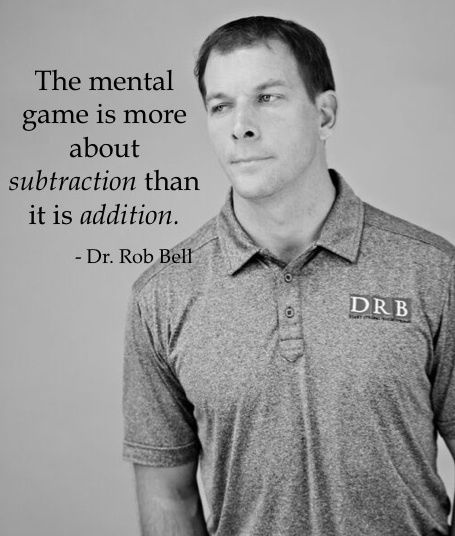
If you want a free download of Quotes, then click here for The BEST Mental Toughness Quotes That Will Make You BETTER…
If you’ve followed my writings or me for any amount of time, you’ll know I’m a quotes honk.
My belief is that motivation is like brushing our teeth. We need to do it every day! We need to marinate our mind with positivity, truth, and the purpose of focusing on others!
I put together a post of the best visual quotes that you can share. I elaborated a bit on why I chose these 12 mental toughness quotes as well. Feel free to post any of the images as well.
Top 12 (Visual) Mental Toughness Quotes For Success
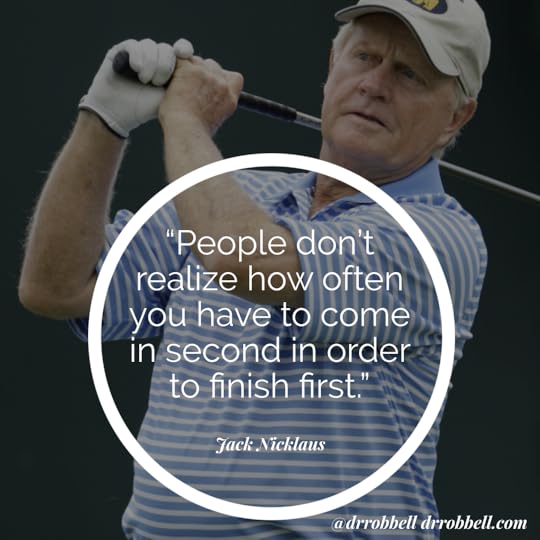 If winning was easy, everybody would do it. The best golfer in the world shares how hard it really is to win at any level of competition.
If winning was easy, everybody would do it. The best golfer in the world shares how hard it really is to win at any level of competition. People don't realize how often you have to come in second in order to finish first.
Click to Tweet
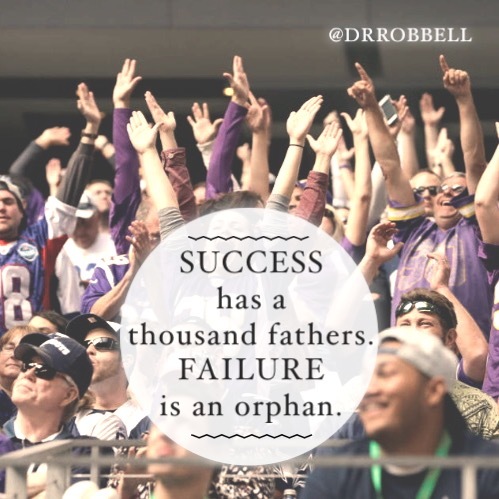 When you win or have success, your phone blows up. But, When you fail or are fired, only then do you realize who truly cares about you.
When you win or have success, your phone blows up. But, When you fail or are fired, only then do you realize who truly cares about you. Success has a thousand fathers. Failure is an orphan.
Click to Tweet
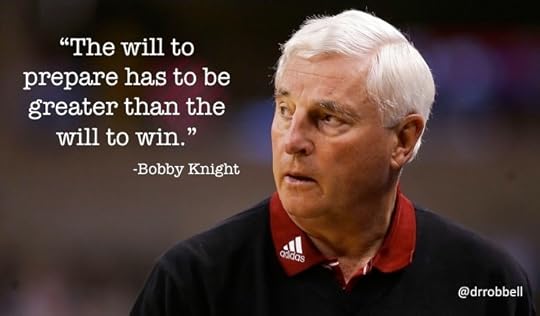 Self-explanatory... It's the will to do the small details...
Self-explanatory... It's the will to do the small details...The will to prepare has to be greater than the will to win.
Click to Tweet
 We have NO idea the impact of our actions or how we make a difference in others lives. That's the importance of NO ONE gets There ALONE.
We have NO idea the impact of our actions or how we make a difference in others lives. That's the importance of NO ONE gets There ALONE. We can count the number of seeds in an apple, but we can't count the number of apples in one seed.
Click to Tweet
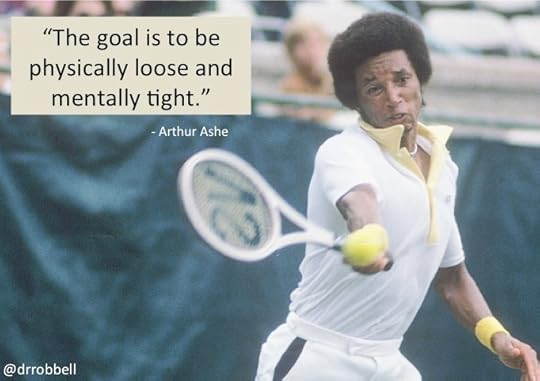 Mental Toughness quote from the most impactful athlete ever...
Mental Toughness quote from the most impactful athlete ever...The goal is to be physically loose and mentally tight
Click to Tweet
 Frankly, This is how good you have to become to reach greatness. How are you on your worst day?
Frankly, This is how good you have to become to reach greatness. How are you on your worst day? On your worst day, you need to beat people at their best.
Click to Tweet
 Every person or team has their own errors that they have to eliminate. Because more games are lost than they are actually won.
Every person or team has their own errors that they have to eliminate. Because more games are lost than they are actually won. If you want to understand what wins, you HAVE to understand what loses.
Click to Tweet
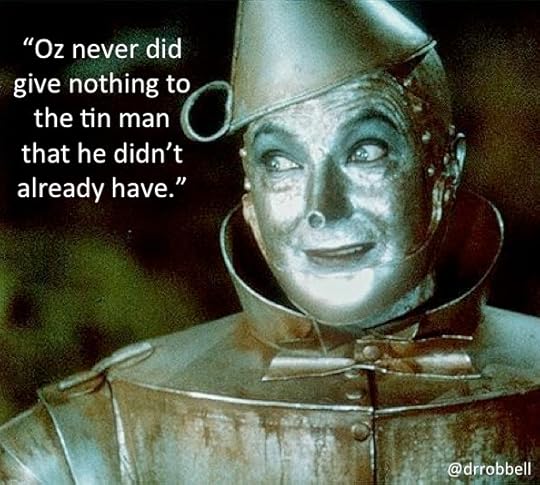 After you have success, remember, you had it inside all along! Winning does not make you, the process does...
After you have success, remember, you had it inside all along! Winning does not make you, the process does...Oz never did give nothing to the tin man that he didn't already have.
Click to Tweet
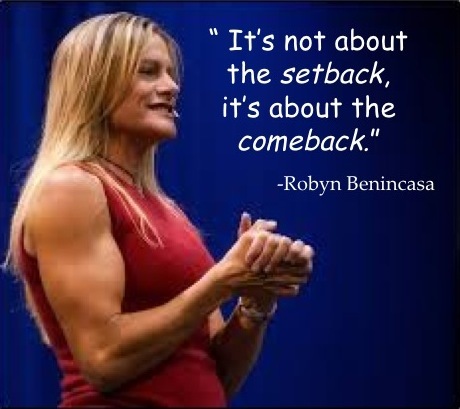 Bad things will happen, it's ALL about how we overcome it.
Bad things will happen, it's ALL about how we overcome it. It's not about the setback, it's about the comeback.
Click to Tweet
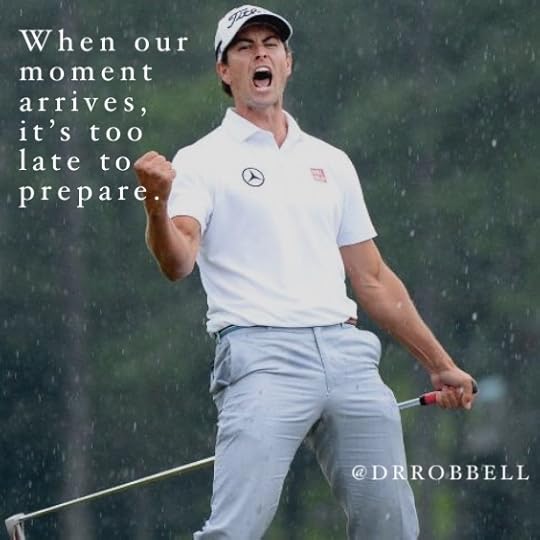 Be prepared for your Hinge moment.
Be prepared for your Hinge moment. When our moment hits, it's too late to prepare.
Click to Tweet
 Our actions DO make a difference, we just can't know the impact! Life is about creating a better US.
Our actions DO make a difference, we just can't know the impact! Life is about creating a better US. Plant trees that you'll never see.
Click to Tweet
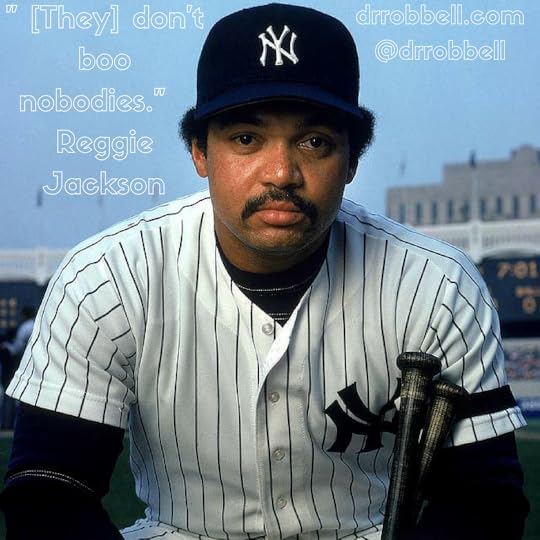 If others are talking about you, it means you're doing something great! Not everyone will be a fan though, in fact, most won't. Keep at it and don't worry about "them."
If others are talking about you, it means you're doing something great! Not everyone will be a fan though, in fact, most won't. Keep at it and don't worry about "them." They don't boo nobodies.
Click to Tweet

Dr. Rob Bell is a Sport Psychology Coach. His company DRB & Associates is based in Indianapolis. Some clients have included: Indy Eleven, University of Notre Dame, Marriott, and Walgreens. Check out all the books.
Please check out the podcast 15 Minutes of Mental Toughness as we interview expert athletes and coaches about Mental Strength and their Hinge Moment.




